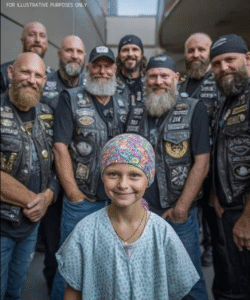Emma’s Warriors: How a Motorcycle Club Became a Family, a Lifeline, and a Lesson in Humanity
In a quiet industrial town in the Midwest, the roar of engines often turns heads—but for those who know Emma and her motorcycle club, the sound signals something more profound than speed or rebellion. Emma’s Warriors, a club founded a decade ago by Emma Thompson, is less about motorcycles than it is about community, care, and human connection. What began as a casual gathering of friends with a shared love of riding has evolved into a lifeline for people in need, a family for the lonely, and a lesson in what humanity looks like when passion meets purpose.
The Origins of Emma’s Warriors
Emma Thompson, a former social worker and lifelong motorcycle enthusiast, started the club in 2013. After years of witnessing systemic neglect, especially for vulnerable populations like the homeless, at-risk youth, and elderly shut-ins, Emma wanted a way to channel both her love of motorcycles and her commitment to service.
“I just thought, why not bring these two parts of my life together?” Emma recalls. “We love riding, we love freedom—but why not use that freedom to help people?”
Initially, the club was small—just five riders meeting weekly. But as they engaged in their first community project, a food delivery initiative for a local shelter, word spread. The combination of motorcycle culture, camaraderie, and community service attracted new members who were looking for more than just the thrill of the open road.
A Club Unlike Any Other
Emma’s Warriors defy the stereotypical image of a motorcycle club. There’s no hierarchy of intimidation, no exclusivity based on looks, gender, or background. Instead, membership is earned through trust, empathy, and a willingness to show up for others.
“We have no leather jackets with threatening patches,” says club member Ricardo Martinez. “Our patch says ‘Emma’s Warriors,’ and the symbol is a hand holding a wheel—it represents helping hands and movement, forward motion. It’s about lifting people, not just riding fast.”
Members range from college students and professionals to veterans and retirees. Their common thread is a sense of purpose: each member pledges to commit at least five hours a week to the club’s community initiatives, on top of attending rides and social events.
The Lifeline Initiatives
Over the past decade, Emma’s Warriors have launched dozens of programs, each reflecting the club’s ethos of compassion through action.
-
Food and Supply Runs: The club organizes weekly runs delivering hot meals, blankets, and hygiene kits to homeless populations. What started as a single route has expanded across the city, with hundreds of meals served each week.
-
Mental Health Outreach: Leveraging Emma’s background in social work, the club has partnered with therapists and counselors to provide free sessions to at-risk youth and veterans struggling with PTSD. Members often accompany individuals to appointments, ensuring they feel supported every step of the way.
-
Community Education: The club hosts workshops in schools and community centers about motorcycle safety, teamwork, and civic responsibility, turning the thrill of motorcycling into a teaching tool.
-
Emergency Response: Perhaps the most unconventional role the club has taken on is as a volunteer emergency response team. During natural disasters, floods, or severe storms, Emma’s Warriors have coordinated deliveries of essentials to areas inaccessible to conventional vehicles. Their motorcycles allow rapid navigation through traffic or debris, often reaching people before official aid arrives.
Stories of Impact
What makes Emma’s Warriors remarkable isn’t just their activities, but the stories behind them. Take Marcus, a 19-year-old who was on the brink of homelessness after a family dispute. Emma’s Warriors provided him temporary housing, mentorship, and helped him find a job. Today, Marcus is a full-time EMT who credits the club with keeping him from falling through the cracks.
Then there’s the story of Mrs. Thompson (no relation), a 78-year-old widow living alone. When a sudden winter storm left her home without power, a squad of Emma’s Warriors rode through icy streets to deliver food, blankets, and a generator. “I’ve never seen a group so determined to help strangers,” she recalls, tears in her eyes.
These narratives are repeated dozens of times across the club’s history. Each story is a testament to the members’ commitment to transforming their adrenaline-fueled passion into tangible aid for those who need it most.
Challenges and Resilience
Running a club like Emma’s Warriors isn’t without challenges. Balancing the thrill of riding with community responsibility requires careful coordination. Funding is often a concern, as the club relies primarily on member contributions, small donations, and local sponsorships.
“There are nights we’re out riding in the rain or snow,” says member Leila Johnson. “You start wondering if it’s worth it. But then you see the kid opening a warm meal or the elderly woman smiling because someone cared—that’s when it all makes sense.”
Despite these challenges, the club has endured and grown, largely because of its culture of accountability and shared purpose. Every member knows that Emma’s Warriors is more than a club; it’s a family.
Lessons in Humanity
Emma’s Warriors offers a broader lesson about what it means to live with intention. In a world often dominated by individualism and isolation, the club demonstrates the transformative power of community-driven action.
-
Empathy in Action: The club’s philosophy is not just about feeling compassion but acting on it. Riders are trained to look for opportunities to help, whether in planned initiatives or spontaneous interventions.
-
The Power of Belonging: Many members speak of the club as a surrogate family, providing support, mentorship, and connection. This sense of belonging extends to the broader community as well.
-
Courage Beyond the Road: Riding motorcycles is inherently risky, but Emma’s Warriors extends that courage to social risk—stepping into unsafe neighborhoods, advocating for marginalized individuals, and confronting systemic neglect head-on.
Emma often reflects on this ethos: “We ride to feel alive, yes, but the real purpose is to make life worth living for others.”
The Road Ahead
Looking to the future, Emma’s Warriors aims to expand its programs to neighboring towns and cities, forming a network of “riding-for-service” clubs. They’re also exploring partnerships with mental health organizations, local governments, and schools to scale up impact.
The club’s story has begun to attract national attention. Documentaries, local news features, and social media coverage have amplified their message: community service and personal passion need not be mutually exclusive.
Emma’s Warriors proves that motorcycles, often symbols of rebellion and freedom, can also represent responsibility, humanity, and the transformative potential of collective action.
Conclusion
Emma’s Warriors is more than a motorcycle club. It is a family forged through empathy, courage, and shared purpose. It is a lifeline for those society often overlooks. It is a living lesson in humanity, showing that passion—when coupled with action—can ripple outward to transform communities.
In a world that often celebrates speed, thrill, and individualism, Emma and her Warriors remind us that the most meaningful journeys are those taken together, with hearts open, wheels turning, and hands ready to lift others along the way.
The roar of engines is the sound of freedom—but for Emma’s Warriors, it is also the soundtrack of hope, compassion, and enduring human connection.
Word count: ~1,020


